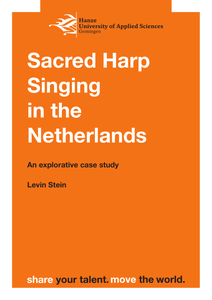In 1999 studeerde Cindy van den Bremen af aan de Design Academy Eindhoven op 4 ontwerpen van sporthoofddoeken. Inmiddels is het merk Capsters uitgegroeid tot de Capsters BV en is er naast de sportlijn ook een casual en exclusive lijn.
DOCUMENT
This study employed an exploratory approach by applying practice theory to insights gathered throughthe triangulation of interview, document analysis and observation methodologies to 1) map the SacredHarp Singing practice scope and give a nuanced picture of its performativity in the Netherlands, witha particular focus on the Sacred Harp group from Amsterdam comparing it to one from Bremen and 2)investigate the underlying rise of transformative emotions, the social, secular, and religious meanings, andthe sense of belonging to an international community. The findings suggest that Sacred Harp enthusiastsin the region are keen on retaining the legacies of the traditional singers by establishing similar singingatmospheres and by following the practice’s historical customs and practices, including the communalsinging in the “hollow square” and the affinity towards democratic participation. The findings alsoindicate that while there is a noticeable level of commitment and excitement among local enthusiasts,the growth of the groups’ memberships is hampered by a lack of interest by the general public, possiblyin connection with insufficient strategies for publicizing the practice. Therefore, the existence of thesebarriers could imply that the practice would probably grow at a relatively slow pace in the region.
DOCUMENT

This research examines the impact of transitioning to an autonomous operation on the airside of Schiphol airport, with a specific focus on emissions that affect both the environment and the staff working within airport premises. This study will explore current emissions from vehicles on Schiphol's airside, assessing their environmental impact and identifying harmful emissions. It will evaluate potential solutions, notably the role of electric vehicles, comparing this to the status quo before mapping the transition to an autonomous airside and its environmental consequences. A significant focus will be on the implications for staff working in these conditions. Additionally, it will review relevant laws and regulations to propose improvements, aiming to enhance Schiphol's environmental footprint. Conducted by Bright Sky for Schiphol Airport, this research aims to address overlooked harmful substances at the airport, seeking prompt solutions. Utilized by Schiphol, the findings will shed light on the necessity for innovation towards electric and autonomous vehicles, underlining the urgency for environmental improvements and technological advancements to tackle pollution issues effectively.
MULTIFILE

IGNITION (European Digital Literacy Coalition for Inclusion, Collaboration and Inclusion in Higher Education) is an Erasmus funded Cooperation Partnership and its main goal is to enhance digital literacy and inclusion for teachers, faculty staff, students and life-long learners in external organizations that partners collaborate with. IGNITION aims to increase awareness of and competence development in digital literacy of all people involved in digital transformation of higher education institutions through the project’s outcomes: A Common Digital Agenda that gives direction to our activitiesan Online Self-assessment tool to learn from and with each other; the Digital Challenge Innovation Learning Lab (DChiLL),the transnational Community of Practice for Digital Literacy and Inclusion (CoP), and the Toolkit for engaging with external stakeholders through digital mediaPartners are Hanze University of Applied Sciences (The Netherlands), South East Technological University (Ireland), Hochschule Bremen (Germany), Polytechnic Institute of Braganza (Portugal).
The project proposal focuses on Virtual Humans (VHs) emerging as a Key Enabling Technology (KET) for societal prosperity. VHs (or embodied, digital, intelligent agents) are highly realistic and highly interactive digital representations of humans in entertainment of serious applications. Most known examples – beyond video games and virtual media productions – are virtual influencers, virtual instructors, virtual news readers, and virtual doctors/patients in health care or therapy. It is increasingly difficult for academic and applied researchers, let alone for users and policymakers, to keep up with the technological developments, societal uses, and risks of VHs. Due to its expertise in game technology, immersive media, and applied AI, BUas is one of the leading partners of the regional Virtual Human Research, Development and Innovation (RDI) agenda. MindLabs coordinates this agenda with BUas, Fontys Uas, and Tilburg University as principal partners. The multidisciplinary RDI agenda integrates design and engineering research, use case applications and evaluation as well as ethics and critical societal reflection. This regional Virtual Humans agenda, however, is not (yet) linked to the EU RDI agenda. Collaboration on Virtual Humans RDI is not yet well established in EU institutions and networks. The aim of this project is to 1) strengthen (our) European-knowledge position on VHs by joining and building networks to find out what the research and innovation agenda on VHs looks like; 2) Conduct one or more experimental studies on empathic interaction between real- and virtual humans to develop a multidisciplinary R&D agenda (pilot title: 'Virtual Humans – Real Emotions'); 3) Develop the ideas, content and partnerships for strong EU-funded RDI proposals In the VESPER project, we partner up with researchers and knowledge institutes the Humbolt University and the University of Bremen in Germany and Howest in Belgium.